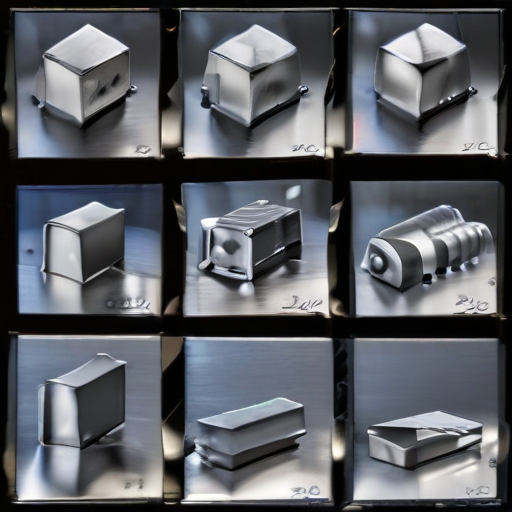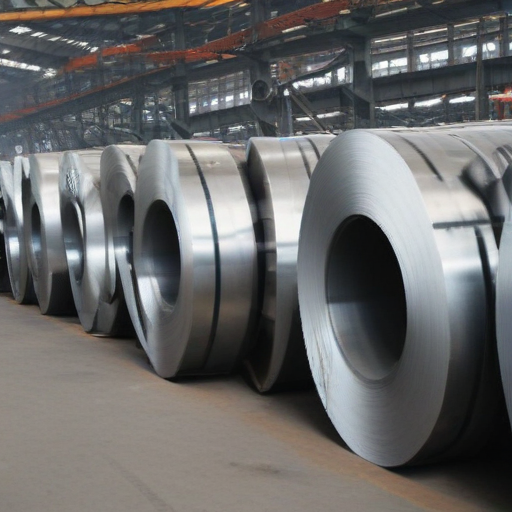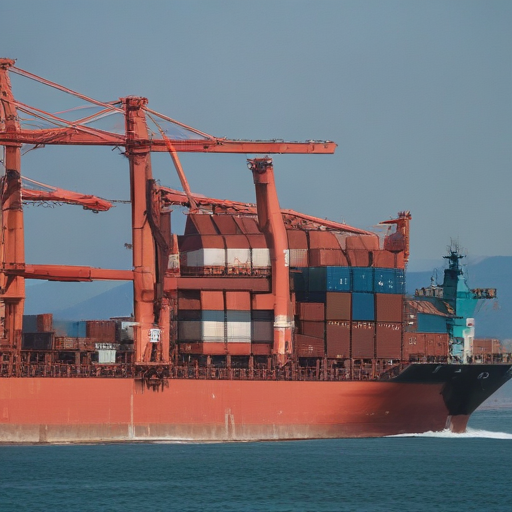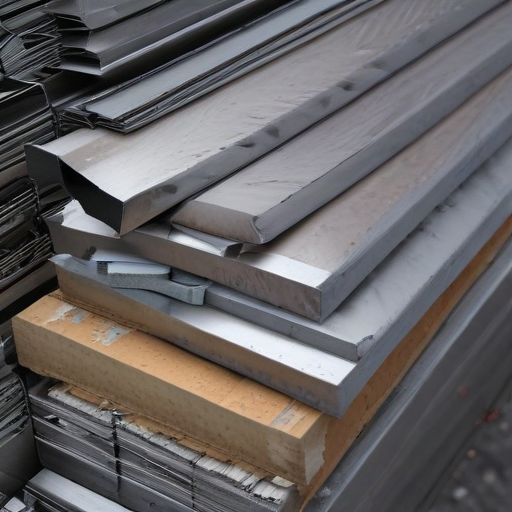Top miscellaneous metals in China introduce,list main products and website if have
1. Tungsten:
Main products: Tungsten ore, tungsten powder, tungsten carbide, tungsten tools, tungsten alloys, etc.
Website: China National Tungsten Company (www.cntungsten.com)
2. Molybdenum:
Main products: Molybdenum ore, molybdenum oxide, molybdenum disulfide, molybdenum wire, molybdenum alloy products, etc.
Website: China Molybdenum Co., Ltd. (www.cmoc.com)
3. Antimony:
Main products: Antimony ore, antimony trioxide, antimony ingot, antimony alloys, etc.
Website: China Minmetals Corporation (www.minmetals.com)
4. Vanadium:
Main products: Vanadium ore, vanadium pentoxide, ferrovanadium, vanadium alloy products, etc.
Website: Chengde Xinxin Vanadium and Titanium Co., Ltd. (www.xxtv.cn)
5. Gallium:
Main products: Gallium metal, gallium oxide, gallium arsenide, gallium nitride, etc.
Website: Yunnan Chihong Zinc & Germanium Co., Ltd. (www.ytn.com.cn)
These miscellaneous metals play a crucial role in various industries such as aerospace, electronics, energy storage, and metallurgy. China is one of the leading producers of these metals and their products in the global market. The websites provided offer more information on the companies’ products, services, and industry updates.

Types of miscellaneous metals
Miscellaneous metals encompass a range of metal materials that do not fit into specific categories like ferrous or non-ferrous metals. These metals are often used in various industries for their unique properties and characteristics. Some common types of miscellaneous metals include:
1. Titanium: Known for its high strength-to-weight ratio, corrosion resistance, and biocompatibility, titanium is commonly used in aerospace, medical, and automotive industries. It is also used in the production of sporting equipment and jewelry.
2. Tungsten: With the highest melting point of any metal, tungsten is used in high-temperature applications such as light bulb filaments, heating elements, and aerospace components. It is also used as an alloying agent in the production of steel.
3. Nickel: This versatile metal is known for its corrosion resistance, high temperature strength, and ductility. Nickel is commonly used in the production of stainless steel, batteries, and magnets, as well as in the aerospace and chemical industries.
4. Zinc: Used primarily as a coating for steel to prevent corrosion, zinc is also used in the production of alloys, batteries, and as a dietary supplement. It is an essential element in the production of brass and bronze.
5. Beryllium: Known for its high strength, light weight, and electrical conductivity, beryllium is used in aerospace, defense, and telecommunications industries. It is also used in X-ray machines, nuclear reactors, and as an alloying agent in the production of copper alloys.
Other types of miscellaneous metals include molybdenum, niobium, and cobalt, each with their own unique properties and applications in various industries. These metals play a crucial role in modern manufacturing and technology, offering a wide range of properties and capabilities for diverse applications.
Pros and Cons of Using miscellaneous metals
Miscellaneous metals are a diverse range of metals that do not fall into traditional categories like ferrous or non-ferrous metals. They are often used in construction, manufacturing, and other industries for specific applications. Here are some pros and cons of using miscellaneous metals:
Pros:
1. Versatility: Miscellaneous metals can be used for a wide range of applications due to their diverse properties and characteristics.
2. Durability: Many miscellaneous metals are known for their strength and corrosion resistance, making them ideal for outdoor use or in harsh environments.
3. Aesthetics: Some miscellaneous metals, such as stainless steel or brass, can enhance the visual appeal of a project due to their unique finishes and colors.
4. Customization: Miscellaneous metals can be easily fabricated and customized to fit specific design requirements, allowing for flexibility in projects.
5. Cost-effective: In some cases, miscellaneous metals can be a more cost-effective option compared to other materials, especially for small-scale projects or prototypes.
Cons:
1. Limited availability: Certain types of miscellaneous metals may be harder to source compared to more common materials, which can lead to delays in projects.
2. Specialized knowledge required: Working with miscellaneous metals may require specialized knowledge and skills, which can increase project costs and complexity.
3. Higher maintenance: Some miscellaneous metals may require more frequent maintenance to prevent corrosion or damage, adding to the overall cost of a project.
4. Environmental impact: The production and disposal of miscellaneous metals can have a significant environmental impact due to the energy and resources required.
5. Weight: Some miscellaneous metals are heavier than other materials, which can increase transportation costs and installation challenges.
In conclusion, while miscellaneous metals offer unique benefits and advantages for various applications, they also come with challenges that need to be carefully considered before use. It is essential to weigh the pros and cons of using miscellaneous metals to determine their suitability for a particular project.
miscellaneous metals Reference Specifications (varies for different product)
Miscellaneous metals refer to a diverse group of metals that do not fall into the traditional categories of ferrous or non-ferrous metals. These metals are typically used in various industrial applications for their unique properties and characteristics.
Some common miscellaneous metals include titanium, zirconium, molybdenum, tungsten, and niobium. These metals are known for their high strength, corrosion resistance, and heat resistance, making them suitable for a wide range of applications.
Reference specifications for miscellaneous metals can vary depending on the specific product and intended use. For example, ASTM International sets standards for the composition, mechanical properties, and testing methods for various miscellaneous metals. The American Welding Society (AWS) also provides guidelines for welding procedures and practices for miscellaneous metals.
When selecting miscellaneous metals for a particular application, it is important to consider factors such as the required strength, corrosion resistance, and temperature resistance. Additionally, the compatibility of the metal with other materials in the system should be taken into account to ensure optimal performance and longevity.
In conclusion, miscellaneous metals play a critical role in various industries due to their unique properties and characteristics. Reference specifications for these metals help ensure that they meet the necessary quality standards for specific applications. By carefully selecting and utilizing miscellaneous metals, manufacturers can create high-performing products that meet the demands of modern industry.

Applications of miscellaneous metals
Miscellaneous metals, such as titanium, tungsten, and magnesium, have a wide range of applications across various industries due to their unique properties and characteristics.
Titanium is often used in aerospace engineering for its high strength-to-weight ratio, corrosion resistance, and ability to withstand high temperatures. It is also commonly used in medical implants and prosthetics due to its biocompatibility and non-reactive nature within the human body.
Tungsten is known for its high melting point and density, making it ideal for applications in the automotive and construction industries. It is commonly used in tools and equipment that require durability and heat resistance, such as drill bits, cutting tools, and electrical contacts.
Magnesium is valued for its low density and high strength, making it a popular choice in the manufacturing of lightweight components for the automotive, aerospace, and electronics industries. It is commonly used in alloys to improve strength and corrosion resistance in applications such as automotive parts, electronic devices, and sporting goods.
Overall, miscellaneous metals offer a diverse range of applications due to their unique properties and characteristics, making them essential materials in various industries for their strength, durability, and performance.
Material of miscellaneous metals
Miscellaneous metals are a diverse group of materials that do not fall into the categories of common metals like steel, aluminum, or copper. These metals are often used in niche applications for their unique properties or characteristics. Some examples of miscellaneous metals include titanium, nickel, tungsten, and zirconium.
Titanium is a lightweight and corrosion-resistant metal that is commonly used in aerospace and medical applications. Its strength-to-weight ratio is higher than most other metals, making it an ideal material for high-performance components.
Nickel is a versatile metal with excellent resistance to corrosion and high temperatures. It is commonly used in the production of stainless steel, as well as in the manufacturing of batteries, electronics, and aerospace components.
Tungsten is a dense and hard metal that is known for its high melting point and exceptional strength. It is commonly used in the production of cutting tools, electrical contacts, and radiation shielding.
Zirconium is a lustrous and highly corrosion-resistant metal that is commonly used in nuclear reactors, chemical processing equipment, and medical implants. Its biocompatibility and resistance to corrosion make it a popular choice for medical devices and implants.
Overall, miscellaneous metals offer a wide range of unique properties and characteristics that make them valuable materials in various industries. Whether it be for their lightweight, corrosion-resistant, or high-strength properties, these metals play a crucial role in many applications where traditional metals may not be suitable.
Quality Testing Methods for miscellaneous metals and how to control the quality
Various quality testing methods for miscellaneous metals include chemical analysis, mechanical testing, non-destructive testing, and visual inspection.
Chemical analysis involves determining the composition of the metal by analyzing its elements and impurities. This can be done using techniques such as spectrometry, X-ray fluorescence, and optical emission spectroscopy.
Mechanical testing assesses the mechanical properties of the metal, such as tensile strength, hardness, and ductility. Common tests include tensile tests, hardness tests, impact tests, and bend tests.
Non-destructive testing methods, such as ultrasonic testing, magnetic particle testing, and eddy current testing, allow for the evaluation of a material’s properties without causing damage to the metal.
Visual inspection involves visually examining the surface and structure of the metal for any defects, inconsistencies, or irregularities.
To control the quality of miscellaneous metals, it is essential to establish proper quality control measures and procedures. This includes implementing regular testing and inspection processes, maintaining accurate records of tests and results, and ensuring compliance with industry standards and specifications.
Additionally, training personnel on proper testing techniques and procedures, investing in quality testing equipment, and partnering with reputable suppliers and manufacturers can help maintain high-quality standards and ensure the reliability and integrity of the metals being used. Regular audits and monitoring of quality control processes can also help identify and address any issues or discrepancies in the quality of the materials.

The Work Process and how to use miscellaneous metals
The work process for handling miscellaneous metals typically involves a few key steps. First, the metals must be identified and sorted according to their type and size. This helps to ensure that the appropriate methods and tools are used for each specific metal.
Once the metals have been sorted, they may need to be cleaned or prepped for further processing. This could involve removing any rust or debris, or cutting the metals to the required size and shape.
After the cleaning and prepping process, the metals can be welded, drilled, bent, or otherwise manipulated to create a desired structure or component. This may involve using specialized tools and equipment, such as welding machines, grinders, or shears.
Throughout the entire work process, safety precautions must be taken to protect workers from potential hazards, such as sharp edges or hot surfaces. Proper protective gear, such as gloves, goggles, and ear protection, should be worn at all times.
Once the miscellaneous metals have been processed and assembled, they can be used in a wide range of applications, from construction to manufacturing. These metals are versatile and durable, making them a popular choice for many industries.
In conclusion, handling miscellaneous metals involves a systematic approach of sorting, cleaning, processing, and assembling the metals to create a final product. By following proper safety protocols and using the appropriate tools and techniques, these metals can be effectively utilized in various applications.
miscellaneous metals Importing questions including Cost,Supplier,Sample,Certification and Market
Importing miscellaneous metals can be a complex process that involves several important factors to consider. Below are some key questions to address when importing miscellaneous metals:
1. Cost: What is the total cost of importing the metals, including transportation, customs duties, taxes, and any other fees? It is important to calculate the total cost to determine if importing the metals is financially feasible.
2. Supplier: Who is the supplier of the miscellaneous metals? It is crucial to work with a reputable and reliable supplier who can provide high-quality metals at competitive prices.
3. Sample: Can you request a sample of the metals before placing a large order? Sampling the metals can help ensure that they meet your quality standards and specifications.
4. Certification: Are the miscellaneous metals certified for quality and safety standards? It is important to ensure that the metals comply with relevant industry standards and regulations to avoid any potential issues.
5. Market: What is the demand for the miscellaneous metals in the market you are targeting? Conducting market research can help determine if there is a demand for the metals and if importing them is a viable business opportunity.
Overall, importing miscellaneous metals requires careful consideration of cost, supplier reliability, sample testing, certification, and market demand. By addressing these key questions, you can make informed decisions and successfully import the metals for your business needs.
How to find and select check reliable miscellaneous metals manufacturers in China
1. Research online: Use search engines and online directories to find miscellaneous metals manufacturers in China. Look for industry-specific websites, such as Alibaba or Global Sources, which list manufacturers and provide customer reviews and ratings.
2. Verify credentials: Check for the manufacturer’s certifications, such as ISO or ASTM, which ensure that they meet quality standards. Look for industry affiliations and memberships, as well as any awards or recognition they may have received.
3. Request references: Ask the manufacturer for references from past clients or customers. Contact these references to inquire about their experience working with the manufacturer, including the quality of their products and services.
4. Visit the factory: If possible, visit the manufacturer’s facilities in person to see their production process and quality control measures. This will give you a firsthand look at their capabilities and help you assess their reliability.
5. Request samples: Request samples of the miscellaneous metals products you are interested in to evaluate the quality and craftsmanship. Test the samples for durability and accuracy to ensure they meet your specifications.
6. Compare quotes: Obtain quotes from multiple manufacturers to compare pricing and lead times. Keep in mind that the cheapest option may not always be the most reliable, so prioritize quality and reputation over cost.
7. Communication: Ensure clear and effective communication with the manufacturer to avoid any misunderstandings. Choose a manufacturer who is responsive, transparent, and willing to work closely with you to meet your needs.
By following these steps, you can find and select a reliable miscellaneous metals manufacturer in China that meets your quality standards and business requirements.
Background Research for miscellaneous metals manufacturers Companies in China, use qcc.com archive.org importyeti.com
QCC.com, Archive.org, and Importyeti.com are useful resources for conducting background research on miscellaneous metals manufacturers in China. These platforms provide access to company profiles, historical data, import/export information, and other relevant details that can help in understanding the operations and market presence of different manufacturers.
QCC.com offers a wide range of company information, including registration details, financial performance, and industry classifications. Users can search for specific companies and obtain comprehensive reports on their background, products, and services. This can be valuable for assessing the credibility and reliability of miscellaneous metals manufacturers in China.
Archive.org is a digital library that stores web pages, documents, and multimedia content for historical reference. By exploring archived websites of manufacturers, researchers can track their evolution, product offerings, partnerships, and market positioning over time. This can provide insights into the company’s growth trajectory and strategic direction.
Importyeti.com is a database of international trade records, which allows users to track import and export activities of companies in different industries. By analyzing the shipment data of miscellaneous metals manufacturers in China, researchers can identify key markets, distribution channels, and trading partners. This information can be instrumental in evaluating the global reach and competitiveness of these manufacturers.
Overall, leveraging these platforms can enhance the due diligence process for identifying reliable and reputable miscellaneous metals manufacturers in China. Researchers can gain a deeper understanding of the industry landscape, competitive dynamics, and market trends by leveraging the insights provided by QCC.com, Archive.org, and Importyeti.com.

Price Cost Research for miscellaneous metals manufacturers Companies in China, use temu.com and 1688.com
When searching for pricing information for miscellaneous metals manufacturers in China, two popular websites to utilize are temu.com and 1688.com.
On temu.com, customers can find a wide range of products from various manufacturers. By searching for miscellaneous metals manufacturers on the platform, users can compare prices and features of different products easily. The website also provides customer reviews and ratings to help guide purchasing decisions.
1688.com is another useful platform for researching pricing information for miscellaneous metals manufacturers in China. As a wholesale marketplace, customers can find competitive prices and bulk discounts on a wide range of products. The platform also offers a secure payment system and guarantees authenticity of products.
Overall, both temu.com and 1688.com are valuable resources for customers looking to research pricing information for miscellaneous metals manufacturers in China. By utilizing these platforms, customers can compare prices, features, and customer reviews to make informed purchasing decisions.
Shipping Cost for miscellaneous metals import from China
The shipping cost for importing miscellaneous metals from China can vary depending on a few key factors such as the weight of the shipment, the type of shipping method chosen, and the destination country. Typically, the most cost-effective shipping method for importing goods from China is via sea freight.
When shipping miscellaneous metals from China, it is important to consider the weight and volume of the shipment, as these factors will impact the overall shipping cost. The cost of sea freight is usually calculated based on either the weight or volume of the shipment, whichever is greater. It is recommended to work closely with a freight forwarder to determine the most cost-effective shipping option for your specific needs.
In addition to the weight and volume of the shipment, the destination country will also impact the shipping cost. Distance plays a significant role in determining the final shipping cost, so it is important to consider this when planning the import of miscellaneous metals from China.
Overall, the shipping cost for importing miscellaneous metals from China can range from a few hundred dollars to several thousand dollars, depending on the size of the shipment, the chosen shipping method, and the destination country. By working with a reputable freight forwarder and carefully considering these key factors, you can minimize shipping costs and ensure a smooth and efficient import process.

Compare China and Other miscellaneous metals Markets: Products Quality and Price,Visible and Hidden Costs
The Chinese metals market, particularly for materials such as steel and aluminum, is known for its competitive pricing due to the country’s large-scale production capabilities and lower labor costs compared to other regions. However, there have been concerns raised about the quality of products coming out of China, with reports of inferior materials and substandard manufacturing processes leading to potential safety risks.
On the other hand, miscellaneous metals markets in countries like the United States and Europe are generally associated with higher quality products due to stricter regulations and quality control measures. While prices in these markets may be higher compared to China, customers are often willing to pay a premium for the assurance of product reliability and compliance with industry standards.
When comparing the visible costs such as initial purchase price, China tends to offer more affordable options, while other markets may have higher upfront costs. However, the hidden costs associated with lower quality products from China, such as maintenance, repairs, and potential safety hazards, can outweigh the initial savings.
In conclusion, the Chinese metals market offers competitive pricing but may compromise quality, leading to potential risks and hidden costs. Other miscellaneous metals markets prioritize product quality and adherence to regulations, which may come with a higher price tag upfront but could ultimately save customers money in the long run by avoiding maintenance and safety issues. Customers must weigh the trade-offs between price and quality when making purchasing decisions in the metals market.
Custom Private Labeling and Branding Opportunities with Chinese miscellaneous metals Manufacturers
Chinese miscellaneous metals manufacturers offer a range of custom private labeling and branding opportunities for businesses looking to differentiate their products in the market. With their experience in working with a variety of metals such as aluminum, stainless steel, and brass, these manufacturers can create custom products with unique designs and finishes tailored to your brand.
Whether you are looking to add your logo or brand name to existing products or develop completely new designs, Chinese manufacturers can work with you to ensure that your products stand out on the shelves. They offer services such as engraving, die casting, and laser etching to help you create a distinctive look for your merchandise.
In addition, Chinese manufacturers can also provide packaging and labeling services, allowing you to create a cohesive and professional brand image across all aspects of your product. This can enhance your brand recognition and customer loyalty, ultimately leading to increased sales and market share.
By partnering with a Chinese miscellaneous metals manufacturer for private labeling and branding opportunities, you can take advantage of their expertise and cost-effective production capabilities to create high-quality products that reflect your brand values and message. This can help you to establish a competitive edge in a crowded market and drive growth for your business.
Tips for Procurement and Considerations when Purchasing miscellaneous metals
When purchasing miscellaneous metals for your procurement needs, there are several considerations to keep in mind to ensure you are getting the best value for your money:
1. Determine your specific requirements: Before purchasing miscellaneous metals, it is important to clearly define your specific needs. This includes the type of metals required, quantities needed, and any specific requirements such as size, shape, or grade.
2. Research suppliers: It is essential to research and compare different suppliers to find one that offers high-quality metals at competitive prices. Look for suppliers with a good reputation, reliable delivery times, and excellent customer service.
3. Consider the quality of the metals: Quality is crucial when purchasing miscellaneous metals as it can impact the overall performance and longevity of the products. Make sure to inquire about the quality standards followed by the supplier and request samples if possible.
4. Evaluate pricing: While price is an important factor, it should not be the sole consideration when purchasing miscellaneous metals. Consider factors such as quality, reliability, and customer service when evaluating pricing options.
5. Check for certifications and compliance: Ensure that the supplier meets all necessary certifications and compliance standards for the metals being purchased. This includes checking for certifications such as ISO, ASTM, or any other relevant industry standards.
6. Consider delivery times: Timely delivery is crucial when purchasing miscellaneous metals as delays can impact production schedules and project timelines. Make sure to discuss delivery times with the supplier and confirm their ability to meet your deadlines.
In conclusion, when purchasing miscellaneous metals, it is important to carefully consider your requirements, research suppliers, evaluate pricing options, and ensure compliance with quality standards and certifications. By following these tips, you can make informed decisions and ensure successful procurement of miscellaneous metals for your projects.

FAQs on Sourcing and Manufacturing miscellaneous metals in China
Q: How can I find a reliable manufacturer in China for sourcing miscellaneous metals?
A: To find a reliable manufacturer in China for sourcing miscellaneous metals, you can start by networking with industry associations or trade shows. Additionally, you can use online platforms such as Alibaba or Global Sources to search for potential suppliers. It is important to conduct thorough research, verify credentials, and request samples before making a decision.
Q: How can I ensure the quality of miscellaneous metals sourced from China?
A: To ensure the quality of miscellaneous metals sourced from China, it is important to conduct factory audits, request product samples, and ask for certifications such as ISO or SGS. Additionally, you can hire a third-party inspection company to monitor production and conduct quality control checks.
Q: What are the common challenges faced when sourcing miscellaneous metals from China?
A: Common challenges faced when sourcing miscellaneous metals from China include language barriers, cultural differences, quality control issues, and long lead times. It is important to have clear communication, establish quality standards, and work with reputable suppliers to address these challenges.
Q: How can I manage lead times and production schedules when manufacturing miscellaneous metals in China?
A: To manage lead times and production schedules when manufacturing miscellaneous metals in China, it is important to establish clear communication with suppliers, provide detailed specifications, and monitor progress closely. Additionally, you can use production planning tools and software to help streamline the manufacturing process.
Why contact sourcifychina.com get free quota from reliable miscellaneous metals suppliers?
Sourcifychina.com is a reputable platform that connects businesses with reliable suppliers in China for various products, including miscellaneous metals. By contacting sourcifychina.com, you can easily get a free quota from their network of trusted miscellaneous metals suppliers. This allows you to compare quotes and choose the supplier that best meets your needs in terms of quality, pricing, and delivery timeline.
By using sourcifychina.com to obtain quotes from miscellaneous metals suppliers, you can save time and effort in searching for potential vendors on your own. The platform has already vetted and verified these suppliers to ensure they are reliable and capable of meeting your requirements. This can give you peace of mind knowing that you are working with experienced and trustworthy partners.
Additionally, sourcifychina.com offers support throughout the sourcing process, helping you communicate with suppliers, negotiate terms, and manage the logistics of your order. This can streamline the procurement process and reduce the risk of errors or misunderstandings.
In conclusion, by contacting sourcifychina.com to get a free quota from reliable miscellaneous metals suppliers, you can access a network of trusted partners, save time and effort in sourcing, and receive ongoing support for a smooth and successful procurement experience.
